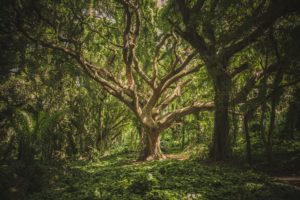
Ho’oponopono and The Kahuna’s World
I became spiritual after practicing ho’oponopono for some time. My original philosophy was very materialist. I believed that the laws of nature we know explain everything and anything else is supernatural, and can be explained scientifically.
Despite this, I grew up in a drug-addled town. Although my friends enjoyed getting high, they always attributed some people’s behaviour (and their highs) to their drug use.
It was ‘cool’ to experiment with drugs, and certainly better than drinking beer (which made many of us vomit).
No matter what substances my friends consumed, no matter what experiences they had, neither was spiritual in any way.
I started to become curious about psychedelics after talking to so many people who used them.
They seemed spiritual to me, yet I hadn’t yet developed that part of myself. Moreover, all the ‘spiritually minded’ adults that I knew eschewed drugs completely.
I was one of the fortunate ones. My work introduced me to Humanistic Psychology through the efforts of John Rowan and others.
Humanistic Psychology aims to get you to the same places as with drug use, yet without consuming any substances.
My misconception, unfortunately, was that to be spiritual means exploring supernatural things.
That’s kind of a scientific view. Scientists assume that spiritual people are concerned with the supernatural world.
Carlos Castaneda writes of getting trapped there. The supernatural, however, is simply a dead-end when it comes to opening your personal awareness.
My first experience with ho’oponopono was to notice a lot of parallels with drugs induced altered states and hypnosis, with what Dr. Ihaleakala Hew Len was discussing.
My understanding of spirituality was completely reset by his teachings about ho’oponopono. I felt a powerful connection to something bigger than my everyday self.
In spite of being brought up in nature, and considering the trees as my friends (and even my father as their enemy when he wanted to prune and pollard them), I grew to see them as ‘things’ rather than living beings.

Trees are really intelligent in a way we don’t imagine today. If you give them the right kinds of attention and enough time, they (and all other plants) will communicate with you.
This doesn’t mean they talk, but you have a powerful connection with them, and they know the power of this connection (even if many of us have forgotten it).
This is something native people know, just as we do when we are children. The conceit (a sense of intellectual superiority) is conditioned into us when we get older, so we don’t feel it any more.
The problem is, if science cannot measure it, then it’s not thought to exist.
Nature seems to belong to us, but we’re all alienated from it when we walk through it.
It’s part of being human, and part of being arrogant. Our failure to see ourselves as animals is also a failure of imagination.
We’re a little different, and in our way, we have transcended nature, or think we have.
Anyway, through the practice of ho’oponopono I felt more like one creature among many than I had ever felt in my life. I was just another creature and it was liberating. It was a wonderful feeling and a very exciting discovery.
Then I had another experience of what people call ‘ego death’. I was able to dissolve my ego, so I became unconcerned by what may have seemed terrifying before I practiced ho’oponopono.
With no ego, there are fewer walls and I just merge into a way of living that is beyond words and there is no subject-object relationship.
The problem with all of this was that (initially) I had no words to explain the changes that were occurring.
Sometimes I would revert to old ones out of habit, and at other times I would simply keep silent (which was preferable).
These experiences led me to rethink what it means to be spiritual.
It’s certainly not anything which may be described by the experiences of everyday living, because different laws of physics seem to apply.
It means understanding the profound connection with something far larger than you.
It’s a kind of love. It’s what just a few people (at least in Western society) have with the universe.
I have it with the plants in my garden and with music. It is so profound that heavy music, or violent art, requires me to clean.
Any experience can be cleaned (whether it appears positive or negative). You may even clean when you receive inspirational thoughts. In this way you’ll be sure that they come from Creative Divinity, rather than your Karmic Data.
That’s how I think of spirituality now. There’s nothing supernatural about it.
You could say well your plants aren’t really conscious but they are sentient beings. We’re the first culture in history that’s forgotten that.
It may be more accurate to think that all things have an overarching ‘spirit’ comprised of consciousness, and a subconscious as well as a superconscious which may access our common Divinity.
That’s how Dr. Hew Len used to explain how plants, and other objects can communicate with us. We’re all joined through our Divine connection.
The scientific worldview historically has blinded us to the sentience all around us. This dates back to Descartes who thought that we were the only thinking creature. No other creature felt pain or had consciousness and most of us still hold to that.
Traditional cultures have believed that many species are sentient, but we have forgotten this.
Ho’oponopono cleaning removes the unlearning. It allows us to see something that all children see and most traditional people see which is the fact that we’re not the only thinking being.
It’s so wonderful to perceive life in this way. Unfortunately, very few Westerners who appear in our lives do.


You May Also Like

Unlocking the Power of Forgiveness: A Simple Guide to Ho’oponopono

Ho’oponopono: A Deep Dive into a Powerful Healing Modality
